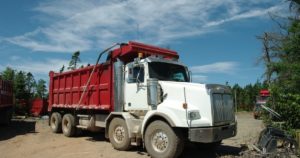Ways to Guard Against Dump Truck Tip-Overs
May 5, 2022 Dump trucks are easy to find on construction sites; they are used to transport various materials and go by several different names, including dumping trucks, dumper trailers and dump lorries. While they serve many useful purposes, they are also accompanied by major dangers, like the chance of a tip over and causing significant injuries or death.
Dump trucks are easy to find on construction sites; they are used to transport various materials and go by several different names, including dumping trucks, dumper trailers and dump lorries. While they serve many useful purposes, they are also accompanied by major dangers, like the chance of a tip over and causing significant injuries or death.
Dump Truck Hazards
Over the last few years, the Federal Motor Carrier Safety Administration, or FMCSA, reported an increase in dump truck accidents severe enough to necessitate towing the vehicle from the scene. In its 2019 report, the agency said that dump trucks accounted for 8% of all fatal crashes involving large trucks and buses. That same year, dump trucks were also involved in more than 6,000 accidents resulting in serious injuries.
According to the Texas Department of Insurance Division of Workers’ Compensation (TDI), numerous factors act together to make dump trucks dangerous. Here are a few examples of these factors:
- One of the top hazards relates to the stability of the truck’s end-dump unit when the box is in a raised position. When the box’s center of gravity and the load are not between the unit’s frame rails, the risk of tip-over increases significantly
- The uneven distribution of a load increases a unit’s chance for tipping over. Loads usually become uneven when someone packs the materials unevenly, when the unit operates on uneven, soft ground or on a slope, and when the load does not properly flow during dumping. Loads may not unload correctly when the materials fail to move out of the top portion of the box or do not flow out of the one portion of the top side like they should
- The truck’s stability may be compromised if the back wheels settle unevenly as the load moves towards the rear during dumping
- Various mechanical conditions can also affect a dump truck’s stability, like poor rear suspension on one side of the vehicle, uneven tire pressure in the rear wheels, worn or inadequate components in the lifting system, like pins, and worn or inadequate lifting cylinders
How to Prevent Dump Truck Tip-Overs
Despite how dangerous operating a dump truck can be, there are several steps that individuals can take to prevent a tip-over from happening. The TDI recommends observing the following critical tips for safely operating and maintaining dump trucks:
- Stay within regulated weight limits
- Always use the right type of truck for the job. For example, project managers should determine whether it is best to use a belly-dump semitrailer or an end-dump semitrailer depending on the requirements of the job
- Lighten the load when the truck is hauling poor-flowing materials
- Make sure that the truck is on even ground before dumping. Stay away from soft, uneven surfaces
- Never dump near people or other vehicles
- Ensure that the tailgate is unlocked and that the dump truck is on a level surface before dumping
- Create and uphold a maintenance program. Regular inspections and preventative maintenance are a top line of defense to safeguard against tip-overs
- Establish and enforce safety procedures and policies
Were You Injured in an Incident Involving a Dump Truck?
Both employers and dump truck manufacturers have a moral and legal obligation to aid in keeping individuals safe. Employers must maintain federally-approved safety and health programs to prevent avoidable workplace accidents from occurring. When a worker does sustain work-related injuries, however, he or she should file a workers’ compensation claim. Workers’ compensation is a type of insurance that provides wage replacement and medical benefits to people who get injured on the job. But, when a dump truck is involved in a workplace accident, it may also be advisable for the injured party to file a claim against the vehicle manufacturer in order to recover additional damages.
If a dump truck is sold in an unsafe condition, due to either a manufacturing or design defect, and it causes an accident that results in injury to someone, the victim has the right to file a claim against the manufacturer, supplier, or distributor. At Galfand Berger, our attorneys have fought on behalf of injured victims for 75 years. In that time, we have successfully litigated thousands of workers’ compensation and products liability claims. Here are a few examples of our firm’s notable recoveries:
- We represented a client who was paralyzed after a catastrophic automobile accident. We filed suit against not only the driver of the at-fault vehicle, but also the auto manufacturer for a dangerous defect that compromised the overall crash-worthiness of the vehicle. Our firm recovered $4,500,000 on behalf of our client. Read more about this recovery here.
- Our client suffered severe injuries in an accident involving a tractor trailer that resulted in amputation of both his legs below the knee. Our team of attorneys successfully recovered $3,000,000 for the victim. Learn more here.
If you were injured in a work-related incident involving a dump truck, someone at our firm can help. If you would like to speak with someone about your injuries, contact a representative online now.
Philadelphia Products Liability Lawyers at Galfand Berger, LLP, Representing Injured Victims Since 1947
If you have a question about filing a legal claim, contact the Philadelphia products liability lawyers at Galfand Berger, LLP today. Call us at 800-222-USWA (8792) or fill out our online form for a free consultation. Located in Philadelphia, Bethlehem, Lancaster, and Reading, we serve clients throughout New Jersey and Pennsylvania, including Allentown and Harrisburg.
 Google Screened
Google Screened
